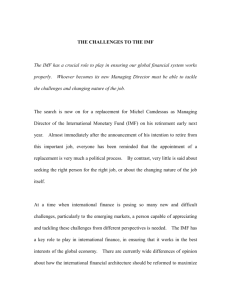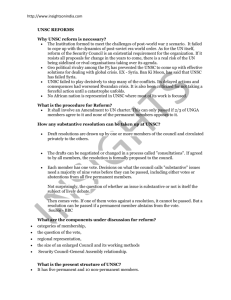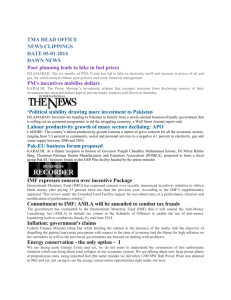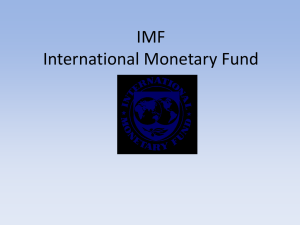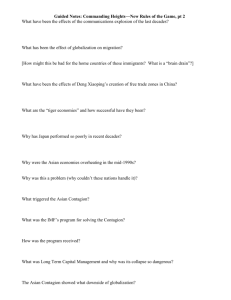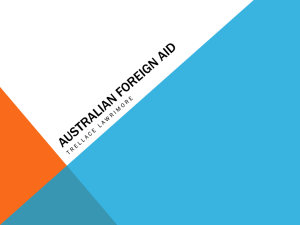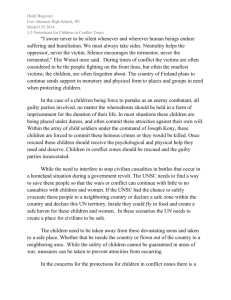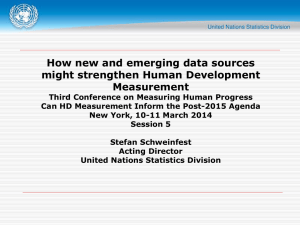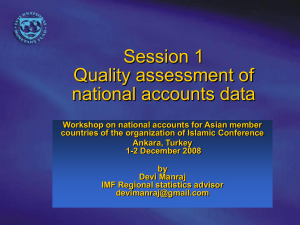Class 27 Lecture notes (to be posted after class)
advertisement
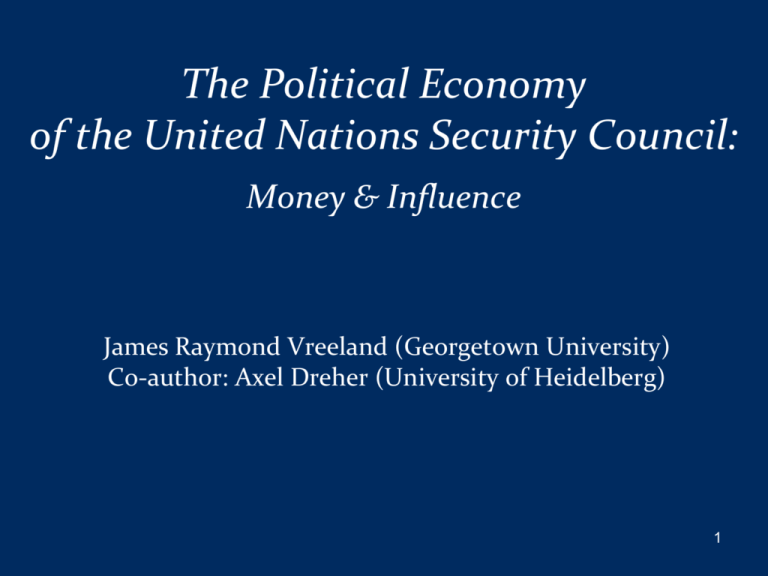
The Political Economy of the United Nations Security Council: Money & Influence James Raymond Vreeland (Georgetown University) Co-author: Axel Dreher (University of Heidelberg) 1 Collaboration Cooperation & Change 3 The UN Security Council IMF/WB project in Ghana IMF World Bank The question: • Do temporary members of the UNSC receive financial perks? Yes. Why? • The United States and other powerful countries seek additional influence over the UNSC. Plan • Overview of the book project • What is the UN Security Council? • Why seek influence over the UNSC? • Evidence – Anecdotes – Large-n The Political Economy of the United Nations Security Council: Money and Influence • Ch1: Money and Politics on the International Stage • Ch2: A Theory of Trading UNSC Votes for Aid • Ch3: Examples of Punishments, Threats, and Rewards • Ch4: Who Wins Election to Represent the World? • Ch5: Statistical Evidence • Ch6: Consequences • Ch7: Reform? What is the UNSC (United Nations Security Council)? What is the UNSC? 5 permanent members with veto power 10 elected members (2 year term - limited) Nominated by REGIONAL caucus, elected by GENERAL ASSEMBLY 3 2 2 1 2 • Resolutions (open ballot) require 9 votes • UNSC votes on – UN military action against aggressors – Economic sanctions & arms embargoes 10 Why bribe/reward votes? • Elected members of the UNSC potentially will vote on matters of extreme international importance • Voting power? • Legitimacy – There is a premium for getting (near) unanimous votes to win domestic public support (Prof. Voeten) – Symbolic – Informational 11 Rally around the flag! 14 Conservative UNSC member Typical US voter US President 15 US President public support before and after military action – with and without UNSC authorization US public opinion support 70% 60% 66% 56% 56% 54% Average priorsupport Average postsupport Average priorsupport Average postsupport Std dev=0.9 Std dev=0.9 Std dev=8.0 Std dev=9.0 50% 40% 30% 20% 10% 0% (n=198, |t|=-0.25) (n=6, |t|=2.11) Without UNSC authorization With UNSC authorization 16 18 19 • The goal of the donor countries: – Get countries under a program – in case important issues come up. • Godfather-esque: – “Some day, and that day may never come, I'll call upon you to do a service for me. But uh, until that day, accept this justice as a gift on my daughter’s wedding day.” • http://www.youtube.com/watch?v=8Bz9iXernY4&feature=fvw 20 Evidence • Some anecdotes*** • Systematic evidence Gulf War Examples • Zimbabwe – UNSC member 1991-92 – 1992 – 1st IMF arrangement in a decade – Votes for 2 resolutions against Iraq – Then abstains… – And Zimbabwe was threatened with new IMF conditions – Subsequently votes for 11 resolutions condemning Iraq. Gulf War Examples • Zaire in early 1991: PRESIDENT of UNSC – Request emergency UNSC meeting – Inconvenient for: –“Zaire was offered undisclosed ‘debt forgiveness’ and military equipment in return for silencing the Security Council when the attack was under way.” Obama – Ondimba • Spring 2011: President Obama & senior State Department officials meet with President Ondimba of Gabon • Why would the United States grant Gabon (pop. 1.5 mil) a high-level meeting? • Gabon supported – Res. 1970 (26 February 2011): Imposed sanctions on Gaddafi’s regime – Res. 1973 (17 March 2011): Established a no-fly zone over Libya & provided the legal basis for the military intervention in the Libyan Civil War. – Res. 1973 was crucial & passed with only ten votes – http://www.npr.org/2011/06/14/137171315/for-u-s-dealing-with-dictators-is-not-unusual Sec. Clinton • Togo elected to the UNSC fall 2011 to serve 2012-13 • Sec. Clinton visits Togo • Why? – “No Secretary of State had ever been to Togo before. – “Togo happens to be on the UN Security Council. – “Going there, making the personal investment, has a real strategic purpose. – “When... you look at the voting dynamics in key international institutions, you start to understand the value of paying attention to these places.” – Sec. Clinton Counter examples? Gulf War Examples • Cuba – UNSC member 1990-1 – Consistently opposed Iraq resolutions – IMF arrangement? – Left the IMF in 1964 – not an IMF member – (Why? Claimed the IMF was a tool of the US) Gulf War Examples • Yemen – UNSC member 1990-1 – Voted against Desert Storm – U.S. representative was overheard declaring to the Yemeni ambassador that it was “the most expensive vote you have ever cast.” – The US cut hundreds of millions of dollars in aid – (No IMF arrangement) A more historical example? • Tanzania – 1961-1974 no IMF, no UNSC – 1975 • UNSC member • First IMF arrangement – exceedingly weak conditionality What does it mean “to explain”? Nomothetic (law-like) vs. Idiographic (descriptive) approaches • Law-like statement: – Whenever & wherever X occurs, X is in a certain relation to Y. • Descriptive statement: – Specifies spatio-temporal locations and makes all subsequent propositions relative to these parameters. Description (idiographic): • Julius Nyerere was the first President of Tanzania from the country’s founding in 1961 until 1985 (his retirement ) • 1975 – UNSC member – First IMF arrangement – exceedingly weak conditionality 32 Law-like (nomothetic): • UNSC members are more likely to receive IMF loans with light conditionality • Other examples: – A particle to which no force is applied will move with constant velocity in a straight line. – Every particle of matter in the universe attracts every other particle with a force that is directly proportional to the product of the masses of the particles and inversely proportional to the square of the distance between them. – E=mc2 33 We can easily apply law-like statements to particular cases… • A particle to which no force was applied in Brazil during the 1960s moved in a straight line with constant velocity. • Particles of matter in Argentina during the 1990s attracted other particles in Mercosur and the rest of the world with forces directly proportional to the product of the masses of the particles and inversely proportional to the square of the distance between them. • In France, E equaled mc2 after the collapse of the Bretton Woods system. True - but redundant - statements. But some would judge the following “improper” because people don’t behave in a universal fashion the way “particles” do. – Import substitution industrialization retards economic development in the long-run. – Fixed exchange rates may fail as credible commitments leading to economic catastrophe. – The Trilemma. We have taken a “nomothetic” approach to IPE • Risky! – We may have made false generalizations • Alternative: • History of international political economy – Descriptive – Less risky – Can lead to the view that every outcome is UNIQUE 36 According to the approach of this class, What is it to explain? • To state the conditions under which a phenomenon always or usually takes place (perhaps probabilistically) • The BRIDGE – The BRIDGE between historical observations and general theory is the substitution of variables for proper names and dates 37 • Instead of: – Julius Nyerere, the first President of Tanzania, saw his country elected to serve on the UNSC in 1975 and entered into an IMF arrangement with light conditions that year. • We have: – UNSC members are more likely to receive IMF loans with light conditionality 38 IMF reply in the Washington Post (November 1, 2006): • An IMF spokesman said “the [Tanzania] evidence is anecdotal and circumstantial.” • To convince people, we need – many more anecdotes – statistical evidence (it’s not just luck) Descriptive data Bilateral aid 1960 to 2009 $140 $140 Millions of 2009 US dollars $120 $98 $100 $80 $80 $74 $66 $60 $51 $41 $40 $40 $21 $20 $0 $39 non-UNSC UNSC members United States non-UNSC UNSC members Japan non-UNSC UNSC members Germany non-UNSC UNSC members United Kingdom (non-UNSC: n=5719) (UNSC: n=339) non-UNSC UNSC members France Enter the IMF & the World Bank 41 Key points about the IMF & World Bank • Involved with developing countries through “programs”: loans+conditions. • Influence over decisions pegged to economic size. • Growing evidence that the major shareholders use their influence for political reasons (e.g. Stone, Reynaud, Momani, Kilby). • Especially when they agree (Copelovitch). 42 Why use IFIs to influence the UNSC? – Political benefits (for both actors) • “DIRTY WORK” (Vaubel) – Leverage benefits • Conditionality & loan disbursements – Cost benefits 43 Figure 1: Participation in IMF programs by non-permanent UN Security Council Membership over time % of obs. participating in IMF programs 50% 40% 30% 20% 10% 0% Nonmembers Members Other years 4 years before 3 years before 2 years before 1 year before 1st year member 2nd year member mean=0.28 mean=0.34 mean=0.28 mean=0.28 mean=0.31 mean=0.33 mean=0.32 mean=0.35 mean=0.34 1 year after 2 years after mean=0.30 mean=0.28 st.dev.=0.45 st.dev.=0.48 st.dev.=0.45 st.dev.=0.45 st.dev.=0.46 st.dev.=0.47 st.dev.=0.47 st.dev.=0.48 st.dev.=0.48 st.dev.=0.46 st.dev.=0.45 (n=6684) (n=462) (n=5405) (n=178) (n=196) (n=215) (n=236) (n=236) (n=225) (n=234) (n=221) UN Security Council Membership Status The horizontal line shows the average IMF participation rate across our entire sample. The dots reflect the results where only low and lower-middle income countries are included. World Bank evidence “It is true that during the Cold War years aid was politically motivated.” “Now however, aid is being delivered to countries most in need and to those who show they are determined to use it well.” (World Bank, FAQ, www.worldbank.org) Average # of World Bank projects by UNSC membership If politics mattered during the Cold War, but not after, this bar should be above the line, members and this one should beUNSC at/below the line…continue to get more World Bank programs 2.5 2.0 1.5 1.0 0.5 0.0 avg=1.29 avg=2.13 avg=1.29 avg=2.06 avg=2.19 avg=1.28 avg=2.15 avg=1.30 avg=2.10 std=1.95 std=2.93 std=1.95 std=2.75 std=3.11 std=1.96 std=2.96 std=1.93 std=2.92 n=5333 n=357 n=5333 n=176 n=181 n=2638 n=183 n=2695 n=174 Nonmember Member Nonmember 1st.year member 2nd year member Nonmember Member Nonmember Member Total sample Over time During the cold war After the cold war Is this a US-thing? • Regional Organizations • Regional Hegemons 48 Asian Development Bank Daniel Yew Mao Lim, Class of 2011 49 African Development Bank Pre-1982 1982 and onward: UNSC Member -0.104 (0.06) 1.717*** (3.55) Pariah state 6.193*** (4.43) 0.072 (0.04) 0.904 (0.48) -1.519** (2.05) 6.582** (2.14) -0.043 (0.29) 1.368 (0.90) 0.026 (0.44) Number of observations 355 1,338 R-squared 0.39 0.07 War ln(GDP per capita, PPP) Political regime Notes: All regressions include country and year fixed-effects and regional quartics (for North Africa and Africa South of the Sahara). Numbers in parentheses are the absolute values of t-statistics. Summary Observation by Russian Student • Bribes – no surprise – Trade money for votes • But the US & allies bribe… – with a loan – must be repaid! • Impressive! Who is surprised? So what? • Reform debate focuses on: – NUMBER of representatives • elected • permanent • No discussion of accountability Accountability, the UNSC, & the Paradox of Stability Criteria are too high! Criteria are too low! Suggested reforms: –Do away with term limits –Let regions elect DISCUSSION 56 DISCUSSION: Will China play the foreign aid game? • How China might use its powerful position in international politics to try to obtain its foreign policy goals? – Dalai Lama? – Caribbean recognition of PRC vs. ROC? – Chiang Mai alternative conditionality? 57 58 Thank you WE ARE GLOBAL GEORGETOWN! 59 61 Gulf War Examples • Ecuador – UNSC member 1991-92 – IMF arrangement in 1991 – Of course Ecuador is a regular IMF customer: 1961, 1962, 1963, 1964, 1965, 1966, 1969, 1970, 1972, 1983, 1985, 1986, 1988, 1991, 1994, 2000 – Voted for all but 2 Iraq resolutions Note Ecuador’s IMF participation pattern above • Countries participate in IMF programs about 25% of the time (including ALL countries). • Typical pattern: 5 years in, 5 years out, 5 years in, etc… 64 Cuba before & after 1961 IMF participation 0.60 0.50 0.40 0.30 0.20 0.10 0.00 Non-member Member Non-member Member n=11 n=4 n=29 n=1 Cuba pre-1961 Cuba post-1961 Repùblica de Nicaragua, América Central IMF participation 1.00 0.75 0.50 0.25 0.00 Non-member Member Non-member Member n=27 n=2 n=9 n=2 Nicaragua 1951-1979 Nicaragua 1980-1990 IMF Participation 1.00 0.90 0.80 0.70 0.60 0.50 0.40 0.30 0.20 0.10 0.00 Non-member UNSC Member n=27 n=7 Brazil 1970-2004 Member Request aid No request Donor No offer Offer aid, set a>0 Nature reveals local politics b Member Member Vote against Vote with Member: b Donor: 0 Member: 0 Donor: v Member: b Donor: 0 Defect Comply Donor Cut Donor Disburse Member: b+a Donor: –a Cut Member: 0 Donor: v-r Disburse Member: a Donor: v–a 68 Is this a US-thing? • Regional Organizations • Regional Hegemons 69 0.60 0.50 0.40 0.30 0.20 0.10 n=1669 n=95 n=1119 n=47 n=1254 n=100 n=591 Africa Asia & S. Pacific LA & Carib. n=36 n=814 E. Europe Member Nonmember Member Nonmember Member Nonmember Member Nonmember Member Nonmember Member 0.00 Nonmember % of obs. participating in IMF programs Figure 3: Participation in IMF programs by UN Security Council Membership and Region n=51 n=998 n=108 Middle East & Industrialized N. Africa Countries UN Security Council Membership Status and Region 70 Implications for governance reform of the IMF: • Q # 1: Is this a bad thing? • Q # 2: Is it in the US interest to change things? • Perhaps not – Short-run political gains. • Long-run economic development? • Elected to the UNSC 6 times • 15 IMF arrangements since 1958 • 32 out of 48 years (66% of the time) 71 In the meantime: • The actual governance reform of the IMF • Increase the voting power of: – China, South Korea, Brazil, Mexico and Turkey • How will this address the political manipulation of the IMF? • It won’t. “It is the correct thing to do, but probably won’t make much difference.” [personal conversation with Pres. Henrique Cardoso, Brazil & 72 Pres. Ernesto Zedillo, Mexico]
